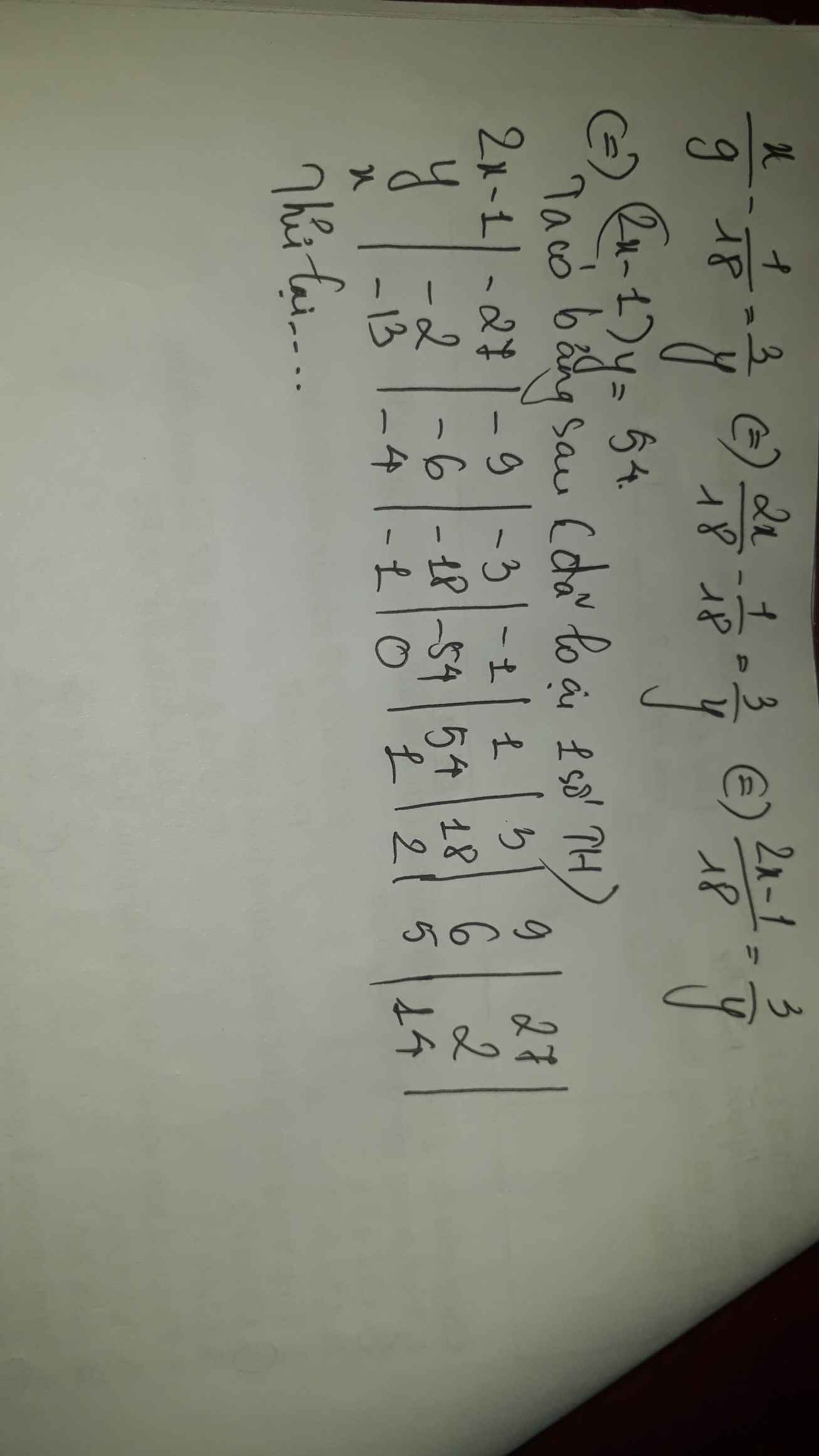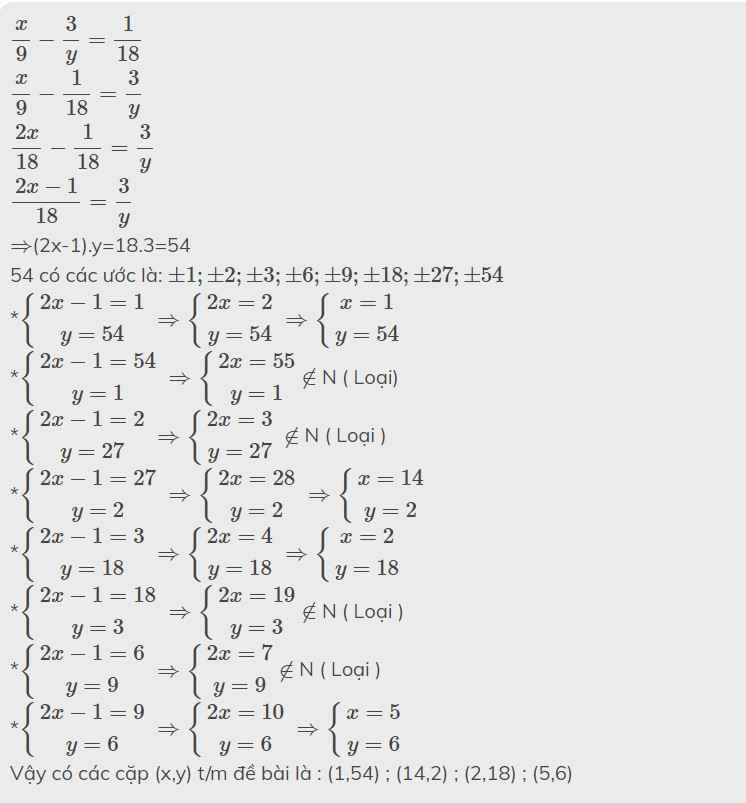Tìm các số tự nhiên x,y sao cho : \(\dfrac{x}{9}-\dfrac{3}{y}=\dfrac{1}{18}\)

Những câu hỏi liên quan
Tìm x, y sao cho \(\dfrac{x}{9}-\dfrac{3}{y}=\dfrac{1}{18}\)
Tìm các số tự nhiên x, y biết: \(\dfrac{1}{x}\)+\(\dfrac{y}{3}\)=\(\dfrac{5}{6}\)
\(\dfrac{1}{x}+\dfrac{y}{3}=\dfrac{5}{6}\Rightarrow\dfrac{6}{6x}+\dfrac{2xy}{6x}=\dfrac{5x}{6x}\Rightarrow6+2xy=5x\)
\(\Rightarrow5x-2xy=6\Rightarrow x\left(5-2y\right)=6\)
Do \(x,y\) là số tự nhiên nên \(x\inƯ^+\left(6\right)\)
TH1: \(x=1\Rightarrow5-2y=6\Rightarrow y=-\dfrac{1}{2}\) (loại)
TH2: \(x=2\Rightarrow5-2y=3\Rightarrow y=1\) (TM)
TH3: \(x=3\Rightarrow5-2y=2\Rightarrow y=\dfrac{3}{2}\) (Loại)
TH4: \(x=6\Rightarrow5-2y=1\Rightarrow y=2\) (TM)
Đúng 0
Bình luận (0)
\(\Leftrightarrow6+2xy=5x\left(x\ne0\right)\)
\(\Leftrightarrow5x-2xy=6\Leftrightarrow x\left(5-2y\right)=6\)
\(\Leftrightarrow x=\dfrac{6}{5-2y}\)
Để x nguyên thì 5-2y phải là ước của 6
\(\Rightarrow5-2y=\left\{-6;-3;-2;-1;1;2;3;6\right\}\)
\(\Rightarrow y=\left\{4;3;2;1\right\}\Rightarrow x=\left\{-2;-6;6;2\right\}\)
Đúng 0
Bình luận (0)
tìm các số tự nhiên x,y: \(\dfrac{4}{x}\)- \(\dfrac{y}{3}\)=\(\dfrac{5}{6}\)
=>(12-xy)/3x=5/6
=>6(12-xy)=15x
=>(12-xy)=5/2x
=>24-2xy=5x
=>5x+2xy=24
=>x(2y+5)=24
=>(x;2y+5) thuộc {(1;24); (2;12); (3;8); (4;6); (6;4); (8;3); (12;2); (24;1)}
mà x,y là các số tự nhiên
nên \(\left(x,y\right)\in\varnothing\)
Đúng 0
Bình luận (0)
Tìm các số tự nhiên x,y biết: \(\dfrac{1}{x}\) + \(\dfrac{y}{3}\) = \(\dfrac{5}{6}\)
Giúp mình với mình đang cần gấp!!!
=> 1/x = 5/6 - y/3
1/x = 5-2y/6
=> x(5-2y) = 1.6 = 6
Do x ∈ N => x >= 0
Mà 6>0 => 5-2y > 0
Vì y ∈ N => 5-2y ∈ N*
Ta có bảng:
| x | 1 | 3 | 6 |
| 5-2y | 6 | 2 | 1 |
| y | -0,5 | 2,5 | 2 |
Do x,y ∈ N => (x,y) = (6,2) (thử lại thỏa mãn)
Vậy x=6; y = 2
Đúng 2
Bình luận (0)
Tìm hai số tự nhiên liên tiếp x và y sao cho: x < \(\dfrac{18}{5}\) < y
giúp mik với mik cần rất gấp ( ôn thi )
Tìm x,y thuộc Z:
(x+1).(y+3)=6
(x-3).(y+1)=11
\(\dfrac{x}{9}\)-\(\dfrac{3}{y}\)=\(\dfrac{1}{18}\)
ai giải giúp mình với
mình đang cần gấp
Đúng 0
Bình luận (0)
tìm 3 số tự nhiên x,y,z biết:\(\dfrac{x+1}{2}=\dfrac{y-5}{3}=\dfrac{z-4}{4}\) và x+y-z=7
\(\dfrac{x+1}{2}=\dfrac{y-5}{3}=\dfrac{z-4}{4}=\dfrac{x+1+y-5-z+4}{2+3-4}\)
\(=\dfrac{7}{1}=7\)
\(\Rightarrow\left\{{}\begin{matrix}x=7.2-1=13\\y=7.3+5=26\\z=7.4+4=32\end{matrix}\right.\)
Đúng 0
Bình luận (0)
tìm 3 số tự nhiên x,y,z biết:\(\dfrac{x+1}{2}=\dfrac{y-5}{3}=\dfrac{z-4}{4}\) và x+y-z=7
Áp dụng t/c dtsbn:
\(\dfrac{x+1}{2}=\dfrac{y-5}{3}=\dfrac{z-4}{4}=\dfrac{x+1+y-5-z+4}{2+3-4}=\dfrac{7+1+4-5}{1}=7\\ \Rightarrow\left\{{}\begin{matrix}x+1=14\\y-5=21\\z-4=28\end{matrix}\right.\Rightarrow\left\{{}\begin{matrix}x=13\\y=26\\z=32\end{matrix}\right.\)
Đúng 0
Bình luận (0)
Cho biểu thức M=\(\dfrac{x}{x+y+z}+\dfrac{y}{x+y+t}+\dfrac{z}{y+z+t}+\dfrac{t}{x+z+t}\)tìm x,y,z,t là các số tự nhiên khác 0, Chứng minh M10<1025






























